
Cara Bean and I decided on simultaneous whims to show off the benefits of our unusually prominent eyeballs by hypnotizing one another first thing Saturday morning. Consequently, we both spent the weekend shuffling about and half-smiling into middle distance while awaiting the other’s instruction.
“How was the show,” we’ll be asked. We’ll abbreviate our answers to varying degrees; significantly for friends who ask politely, substantially for the coworkers who covered our shifts, but our unlucky spouses and lovers will probably have to sit through the ambivalence and pontification the others are spared. It’s a simple question, yes, but with a variety of complicated questions embedded in it.
How should we evaluate our festival weekends? How do we decide if the substantial time and money they require was well-spent? How do we come to conclude that a show was or wasn’t good? There are a lot of potential criteria:
The venue. The Center on Halstead is an elegantly modern and inviting building, well and accessibly located. Once you reached its third floor, all the event’s appendages were conveniently proximate. The panel space was mere steps from the convention floor, across from a roof deck offering fresh air and handsome dancing cowboys in roughly equal measure. There were bleachers where attendees could sit and tear into their new acquisitions. There was (at least allegedly) an exhibitor room filled with actual cake that I never managed to find.
The only thing I didn’t love about the space was the actual gymnasium in which we tablers were arranged. People appreciated, I know, the egalitarian floorplan it facilitated, but I thought it was loud and visually tumultuous and that its echoes of grade school and hometown craft fairs subtly devalued the work on display. And self-publishing cartoonists hardly need any help subtly devaluing their work.
And, I don’t know: something about the cinderblock, and about the weak strains of morning struggling through the skylights during Saturday’s rainier hours left me feeling adolescent and out of place. I recognize I may be more susceptible to these things than other people, but still. It made me blue.
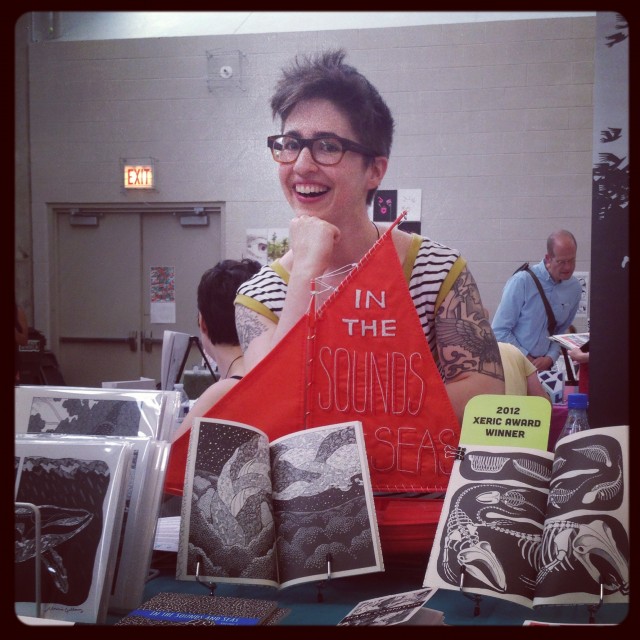
Marnie Galloway, not content merely to make better comics than the rest of us, proceeded to fashion the coolest-ever table display. Unrelatedly, does anyone else think that dude in the background looks oddly familiar?
The crowd. Attendance was unexpectedly strong on Saturday and discouragingly light on Sunday. Note In general, though, I found the composition of the crowd heartening. Among the unscientifically self-selecting sample that stopped at my table, a shockingly high percentage professed not to draw comics, or in some cases anything, themselves. Like, real actual regular people who were just interested in the expo for whatever reason, walking around, checking out comics.
I imagine its location in an LGBTQ community center helped, as did what seemed to me, admittedly a time zone away, to be uncommonly extensive promotion within the city. Also the freeness. One way or another, they got the civilians in the door. It’s a major step further than most of our fests get.
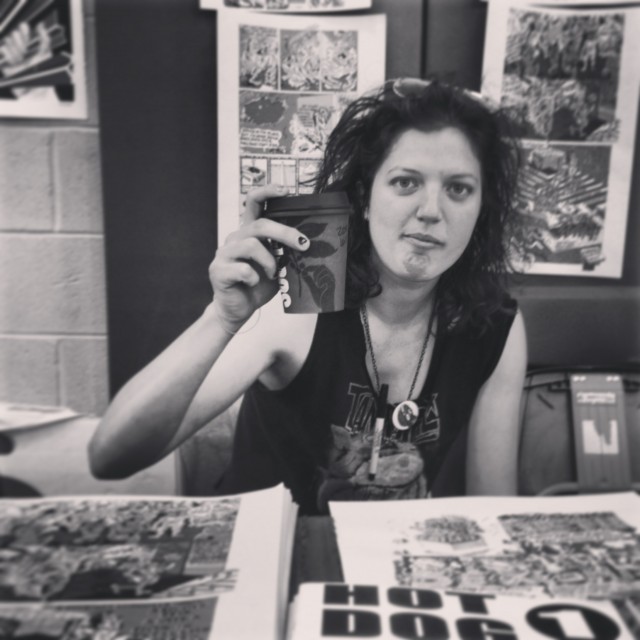
Lale Westvind drinks your health. Or else this is how she challenges people to duels. I’d politely back away, just to be safe.
The staff. The organizers and volunteers of pretty much any festival, regardless of how successful it’s deemed to be, are rightly praised and thanked; whatever they’ve managed to pull off, it’s more than they were paid for. But CAKE’s organizers are an exceptional subset of this exceptional subset of humanity. If there were any hitches in the execution of the weekend, I couldn’t see them. Only SPX, and only on its best years, is run as smoothly.
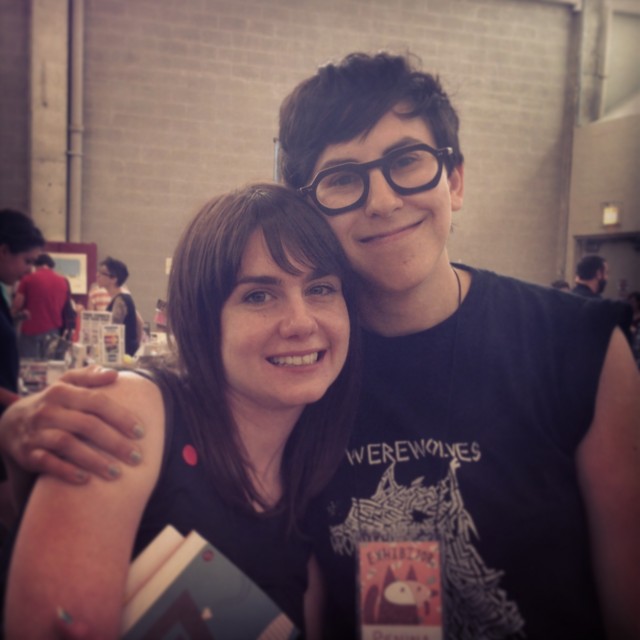
The Midwest puts its best faces forward: Bloomington’s Penina Gal, whose Fire Messenger comics just get prettier and more compelling every issue, and reluctant superstar Caitlin McGurk of Ohio State’s Billy Ireland Cartoon Library.
Can you believe this show is only two years old? No, you can’t. Its attention to detail (the snacks and refreshments, the exhaustively helpful exhibitor emails, the well-coordinated volunteers, the free minicomics-plus-buttons by local luminaries Carrie Vinarsky and Lale Westvind, and the ingeniously simple floor plan establishing separate exhibitor and attendee lanes) and the quality of its guests (Phoebe Gloeckner? Kim Deitch (interviewed by Caitlin McGurk)? Chris fucking Ware?!) make it feel like a much more mature show. The raft of CAKE-affiliated events (not just the afterparties but also the readings, signings, and performances around town in the months and weeks leading up to the main event) make it feel established (while simultaneously raising funds and awareness). Which is presumably why it’s already cited as an integral part of Chicago’s comics infrastructure, one of the things that makes the city a welcoming and supportive home to cartoonists.
So let’s set aside a paragraph of thanks for Neil, Edie, Max, Grace, and Jeff, CAKE’s tireless and innovative all-volunteer organizers. How many times this weekend did we see a blur of purple as you whirled by, and breath easier knowing we were in such capable, attentive hands? How many times did you turn the climate control up, or down, or back up again, to satisfy our collective whim? And how many cups of Wormhole coffee did we drink Note thanks to your foresight and concern for our well being? You guys are the freaking greatest.
Sales. And can we talk about sales for a minute, just to clarify our terms? I know there are those among us, particularly small presses and some of you more successful and prolific webcomics folk, who depend on festivals as a source of income. You guys are my heroes and inspirations, but this isn’t my deal. I run (and am) a business that pays my rent and supports its own money-losing division, which is me drawing comics. Any kind of even remotely honest accounting reveals that I start losing money the moment I decide to exhibit at a festival, and only by ignoring one set of expenses or another can I convince myself otherwise. Good sales can mitigate those costs somewhat, but not all that significantly. This is a labor of love, and of self-involvement. Note
For me, then, sales are a crude proxy for something otherwise unqauntifiable. They are sorely needed feedback, adult life’s equivalent of grades. You guys remember, I’m sure, that perplexingly tone-deaf post on the First Second blog about how we should all give up comics long before a publisher like First Second would ever get around to noticing us. While the question of why we’re doing this and whether it’s worth it isn’t one anyone else should presume to answer for you, it does still need to be answered, and at pretty regular intervals. Sales are how we know we aren’t cutting down trees in an empty forest, that we aren’t just throwing our sweat and passion and talent into the abyss. If someone drops $12 at my table, I conclude she liked my work approximately $12. If I leave the floor Sunday evening with a few hundred dollars crumpled up in my pockets, it doesn’t begin to cover the expense of traveling to Chicago for a show, buying table space, producing the comics I’ll sell there, and the time needed to do all these things. But I’ve collected a few hundred dollars of affirmation I didn’t have when the weekend began. It’s a preposterous measure of an obvious intangible, but it’s all we’ve got. And for this reason, sales are valuable. Invaluable, even.
Alas, the unscientific, self-selecting sample of cartoonists who are willing to talk to me corroborated my experience of sales being pretty meh, even on Saturday. There were exceptions, of course: Tyrell Cannon tore through copies of his stunning new book Victus, one of the show’s most striking and intriguing debuts, at an appropriately break-neck pace, and exhausted his inventory of some older books. The gentlemen of Secret Acres reported negligible Saturday sales followed by a “gangbusters” Sunday (although I’m like 96% certain that was due entirely to other exhibitors who, undistracted by having to make sales of their own, could no longer restrain themselves from blowing what money they’d made on the brilliant and beautifully produced Secret Acres catalog). But there were no shortage of remarkable artists frustrated by lesser fortunes.
Honestly, I’m not sure what to make of it.
One factor, surely, was the aforementioned glut of talent. At a show this good, it simply isn’t feasible to buy all the books that deserve buying. Especially now that we’re slowly starting to attach prices to our minicomics that at least somewhat reflect the cost of producing them (there were a lot of small, $10-$12 black and white books at this show). In an attendee’s position, I’m not at all certain that my money would have stretched as far as my own table. I myself picked up only a handful of minicomics, a small fraction of the ones I lusted after, and am still kicking myself for the rare display of financial restraint.
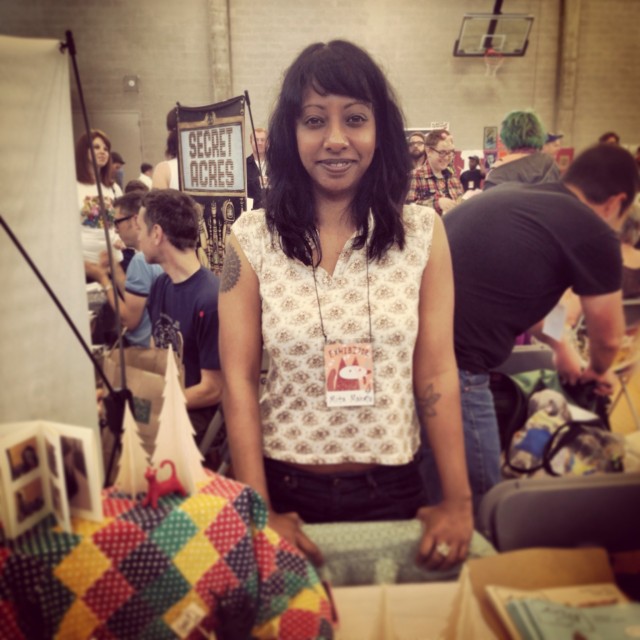
Mita Mahato, whose new book may be the one I most regret not picking up this weekend. Cautionary tale: when you leave before the end of the day, you may not be giving me adequate time to cave to temptation.
A good floor, of course, is an unambiguously good thing. The better the work on display, the better experience attendees will have. They’ll come back next year and bring friends and hopefully expand their budget for the weekend. But the more talent organizers squeeze onto a floor, the more buyers have to be coaxed in the door, Note or else a lot of us go home feeling kinda crappy about ourselves and our work. Again, this is not something with which comics creators, as a community, need any help.
Friends. I don’t think I’ve ever been so excited to see so many people as I was on my way to Chicago. (If you’ve scrolled through this post’s photos, you surely understand why.) That these people are all artists I admire, and many of them would have work of which I hadn’t yet gotten ahold, was a major bonus. My aisle alone, where I was happily nestled between Tony Breed and Rob Kirby on my right and Cara Bean and Jason Viola to my left, and across from Betsey Swardlick and Penina Gal who never let the dance party stop, and within a kneaded eraser’s throw of personal favorites Marnie Galloway, Sophia Wiedeman, Sean Dove, Tyrell Cannon, Beth Hetland, and Mita Mahato, was well worth the airfare.
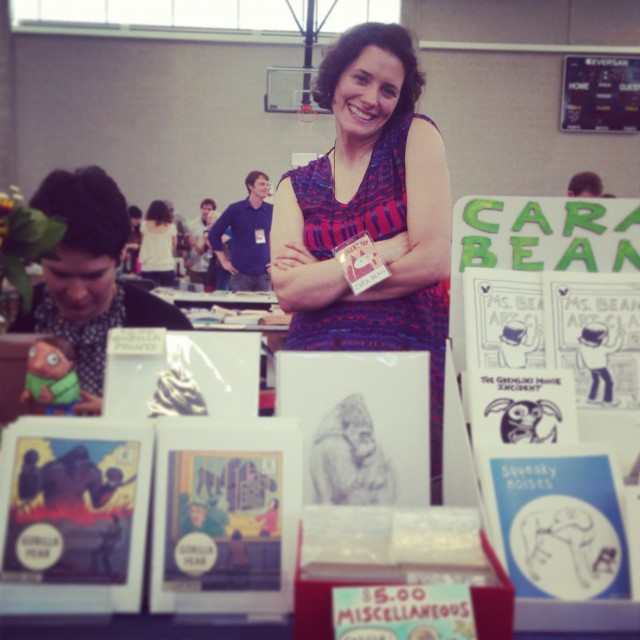
Cara freaking Bean, ladies and gentlemen. Also Rebecca Viola, who may or may not be doting over Wee Ms. Bean.
I know this isn’t true for everyone, but for me, being in the company of good people for a weekend, and under the influence of great art, outweighs strong sales exponentially (not that it isn’t better to have both, thank you SPX 2012). I sold much, much better at TCAF than at CAKE, but because of my poor placement in an out-of-the-way and climatically unpleasant room, I didn’t have nearly as much fun tabling in Toronto (after-hours were another story, of course). So I sincerely hope all the other fest organizers around are paying attention to CAKE’s crowdsourced curation model.
50 Chicago area comics scenesters participated in this year’s exhibitor selection. Each was sent a handful of would-be exhibitors to evaluate, and each applicant was sent to at least five jurists (who were encouraged, according to organizer Neil Brideau, “to consider the importance of supporting local and less-experienced creators, as well as encouraging a diversity of styles at the fest”). People’s scores were then averaged and ranked. This system cleverly avoids the over-curation that plagues other prominent alt-comics shows by ensuring that no single individual’s biases or predilections exert too much influence over the exhibitor list. In the quality of work on display, the diversity of styles and subject matter, and the range of new to established artists, this model is, in my humble opinion, the reigning champion.
That so many of the passionate and dedicated artists present happen also to be such admirable and delightful individuals may be mere coincidence, although I am of the unprovable position that it isn’t.
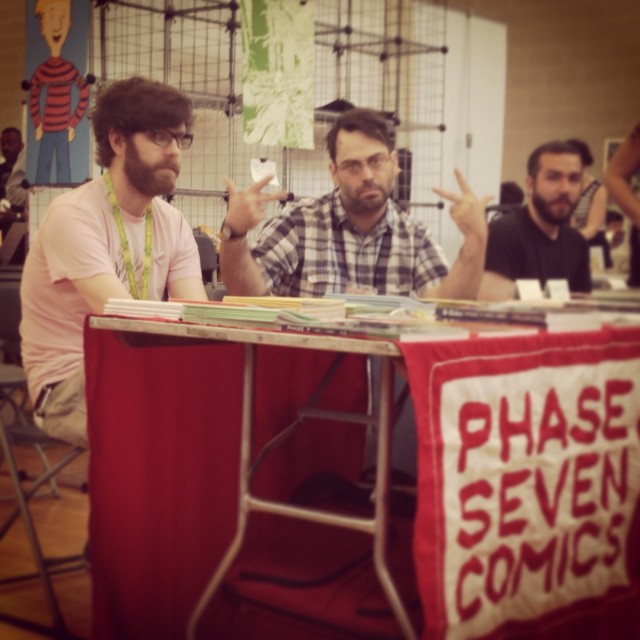
Alec Longstreth and Greg Means have never allowed a candid shot to be taken of them, and they’re not going to start today.
Trades. I left Chicago with a box full of comics that was actually unbelievable, in both volume and quantity, and paid for almost none of it (although in many cases I tried). So let’s just declare this show a roaring, unmitigated success and get on with our lives.
It’s not that the above criteria aren’t factors. But ultimately, I appraise a fest primarily by the quality and quantity of books that were given or traded to me.
I don’t go to shows looking to score particular books; in fact, I rarely initiate trades, because I don’t want to pressure people into transactions they don’t want. So I mostly stand and sell. And yet, when I’m packing my bags at the end of a festival weekend, it’s the comics stuffed into my backpack, rather than the bills stuffed into my pocket, that I’m most excitedly inspecting.
A traded comic book is a comic book, of course. I started attending and then exhibiting at festivals primarily because I love comics, and a stack of new books to read is exciting in and of itself.
But a traded comic is also a statement. It’s my way of telling you I’d rather have your comic than the sandwich selling my own would buy me. It’s how I know you’d rather have me as reader than any of the paying readers walking the floor. And because most of us only cross one another’s paths a few days each year, we come to know each other primarily through our work. We watch our peers develop, as artists and as individuals, and perhaps understand what we’re watching in a different context than other readers. We trade as a way of saying we’d like to know each other better, and as a salvo against the distance that keeps most of us from doing so. Trading is the glue by which our community coheres.
Like sales, trades are a proxy, but, I would argue, a more reliable one, and for something more meaningful. A stack of traded comics is a tally of friendships started and solidified and strengthened. The books we’ve given away have gone to live with the best possible readers, the ones most likely to offer constructive feedback, and to sing our praises if our work is strong, and to come back for more.
This is why I try to write up a few of the comics I found most resonant after each show. I don’t always get around to it, and I certainly never cover all the books that deserve mention. But hopefully I can convey to some small degree why this custom is so important to me, and why a handful of great comics are so important to me, as well.
Recommended Reading
So let’s get on with it:
I first encountered Jeff Zwirek‘s Burning Building Comix in minicomic form at Jim Hanley’s, back in the dark ages when that store was pretty much the only place in the city to find such things. It was one of my early introductions to self-published comics, and a crash course in their potential to marry narrative to form in innovative, playful, and mutually beneficial ways. I was happy, but not at all surprised, when the advance batch of Jeff’s brilliantly assembled, Kickstarter-funded Burning Building Comix collection didn’t make it through much of last year’s SPX. The book stacks each of the five minicomics and ten stories it collects on top of the last, like the floors of the building it represents, allowing us to watch ten different residents in ten different flats discover and escape the eponymous fire simultaneously.
It’s humbling what detail and nuance Jeff can pull off without any words, and part of the fun of these comics has always been witnessing the cleverness of their execution. But collected this way, in the ubiquitous but (we suddenly notice) bizarre format of urban neighbors, they point to a deeper and more troubling foundation. Each character faces the same problem at the same time, and in very close physical proximity to the others, and yet they’re completely unaware of one another. Each goes through his or her traumatic, life-and-death ordeal alone, and it takes the reader’s impossibly god-like perspective to see otherwise. So when the final stories (in every possible sense) begin to subvert the conventions previously established, it’s refreshing both as a nimble act of formalism and as a cautious statement of hope.
***
Tony Breed’s delightful webcomic Finn and Charlie are Hitched, which has so far been collected into three biennial volumes, is the most traditional comic you’re likely to find at a show like CAKE. Each weekly strip comprises three panels, the first two of which set up the comedic payoff in the third. It follows the day-to-day domestic life of a married couple and their ever-expanding and increasingly quirky circle of friends, whose multifaceted personalities reveal themselves slowly over the course of innumerable gags, just like a newspaper comic or 90’s sitcom, except, you know, it’s actually funny.
What’s remarkable, then, is how fresh this formula feels in Tony’s hands, and how utterly up to the task of an honest, intimate, and resonant portrayal of modern life it proves. And I suspect that this is the point. Because sure, as you’ve surmised from the title, the strip’s central relationship is a union of two men, the institutional recognition of which is a historically recent possibility. But there’s really nothing about that union that will feel unfamiliar to anyone who’s ever had a monogamous adult relationship, regardless of generation or gender preference. Finn and Charlie bicker affectionately over groceries and fashion choices, worry about their friends, and grumble over social obligations. It’s a comic concerned with the universality rather than idiosyncrasy of its characters’ experiences. The result is a lot of fun, and often quite touching.
***
The first Three volumes of Caitlin Cass‘s new series The Index trace through history man’s need (or, perhaps, men’s need) to organize and codify the breadth of human knowledge. We learn, in reverse chronological order, of several examples, each ending in some manner of tragedy, be it the fall of a civilization of the degradation of a once-functional relationship. One of the story’s fictional protagonists attempts to make such a catalog out of index cards; it’s a particularly futile example of this impulse, but the comics seem to suggest that any house of knowledge is fundamentally a house of cards.
The omission of Wikipedia, Google, and the rest of Internet is so glaring as to read, to me, as an emphasis. This story, our story, it seems to suggest, is not nearly so novel as we’d like to think it, and it never ends well.
***
It’s not clear to me whether Jason Viola considers his new mini Fear of Flowers to be comics poetry, but I do. Elegantly written and delicately drawn, it describes the peculiarities of three peculiar flowers, each of which seems to know something we don’t. Botanical trivia has never been so lyrical, nor so haunting.
***
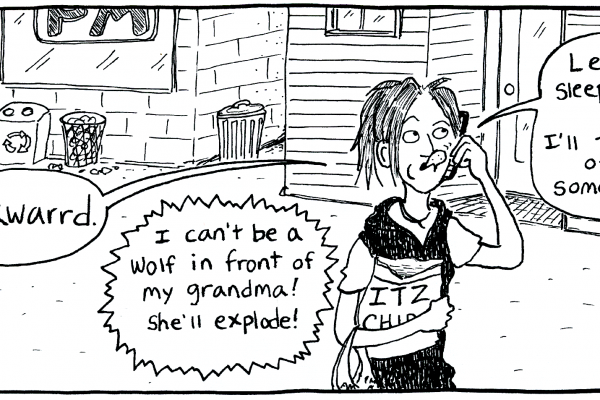
Betsey Swardlick’s Fail Wolves stories are that rarest of treasures: personal and deeply idiosyncratic self-published comics with coherent classical plot structure. Full of witty banter and loose but kinetic illustration, they recount the misadventures of two vegan punk werewolves as they attempt to live and eat ethically, protest injustice, and not bite people. Like their derby-rolling, punk-inflected vegan author, they’re fast and clever and full of heart and totally freaking hilarious. These are some of my very favorite comics, made by one of my very favorite comics people.
***
There are so many more. But this post is already like two months late. I’m sorry if you’ve been slighted.
Until next time…
…Which will be SPX, and then MICE. I’ll have more to blabber about between now and then, and hopefully some new pages to show, so feel free to subscribe if any of that interests you.
But first, I think we’ve all earned a nap. Especially these guys.
 Festival Season
Festival Season 
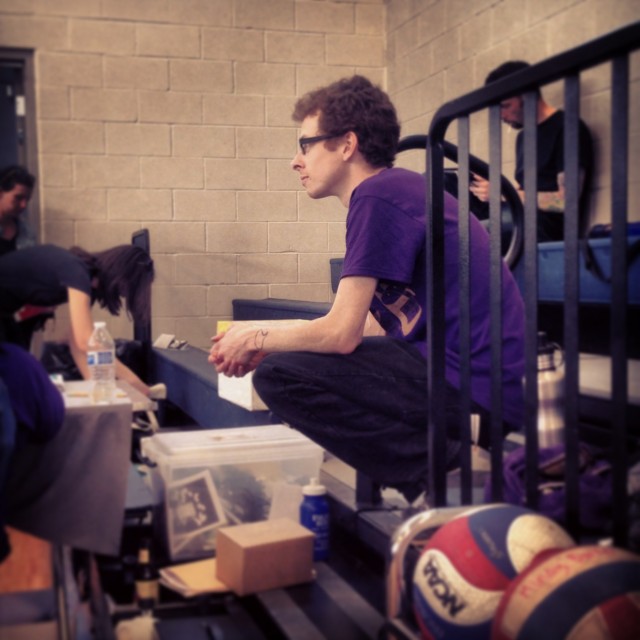
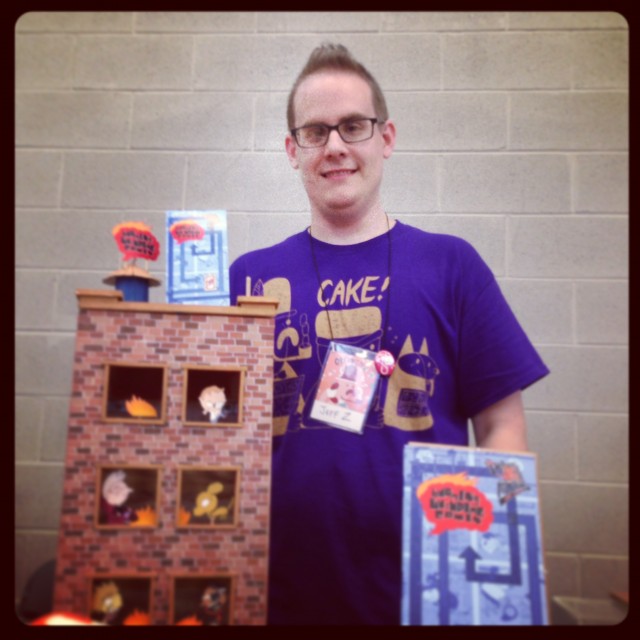
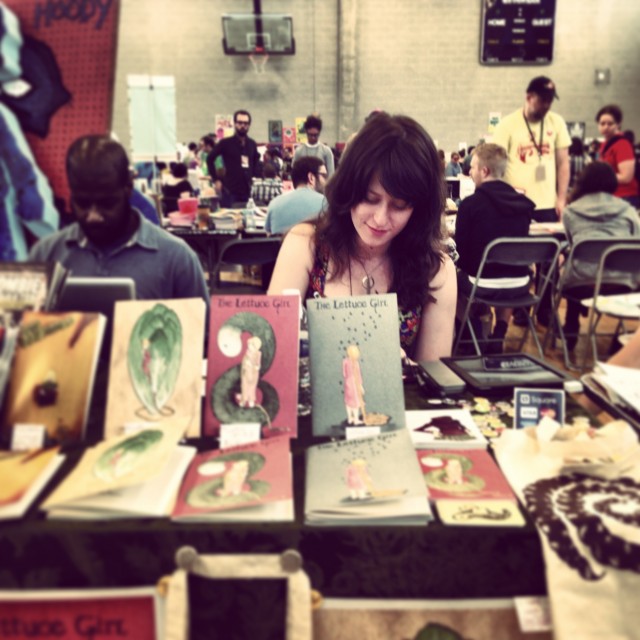
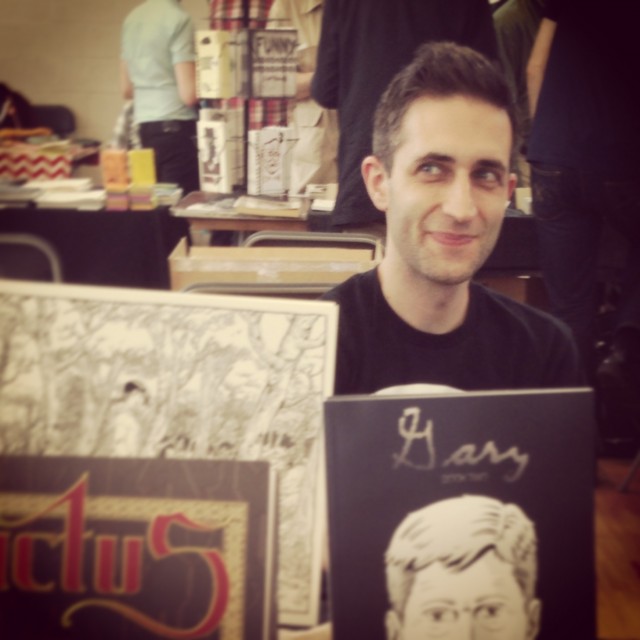
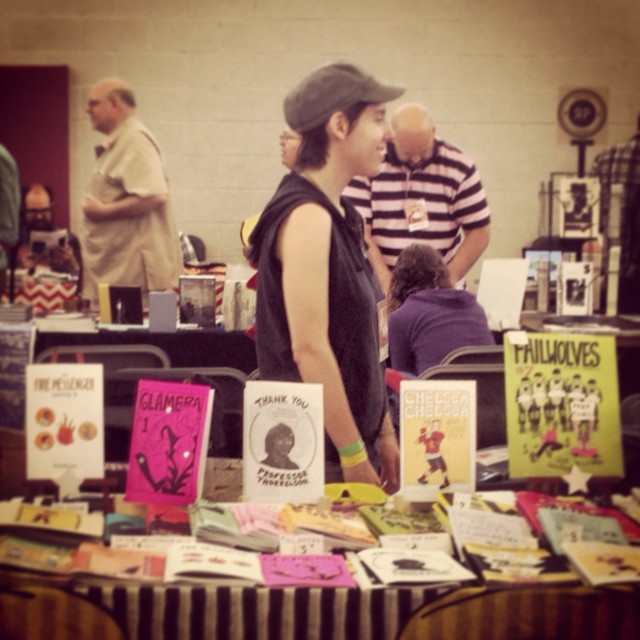
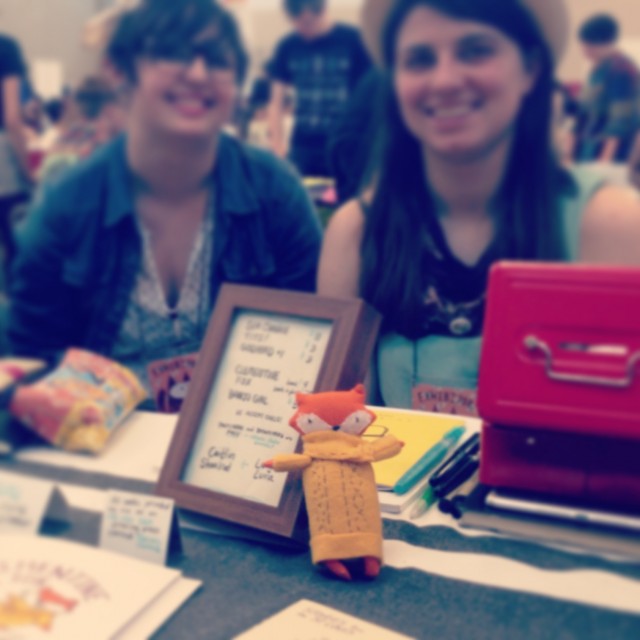
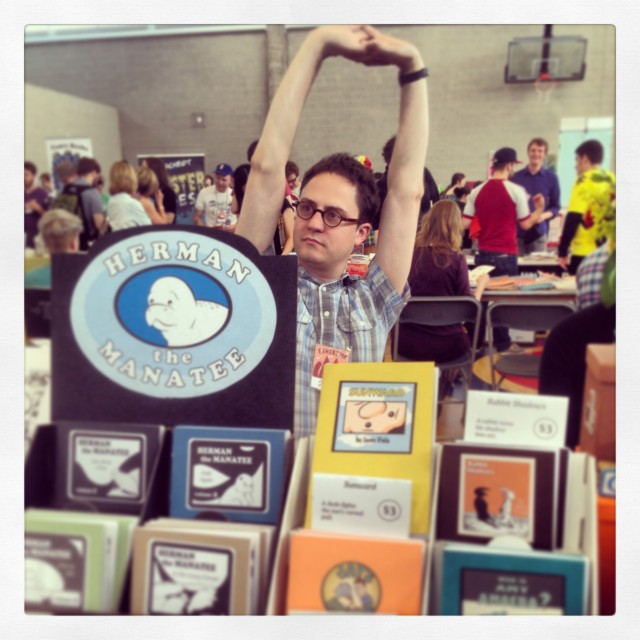
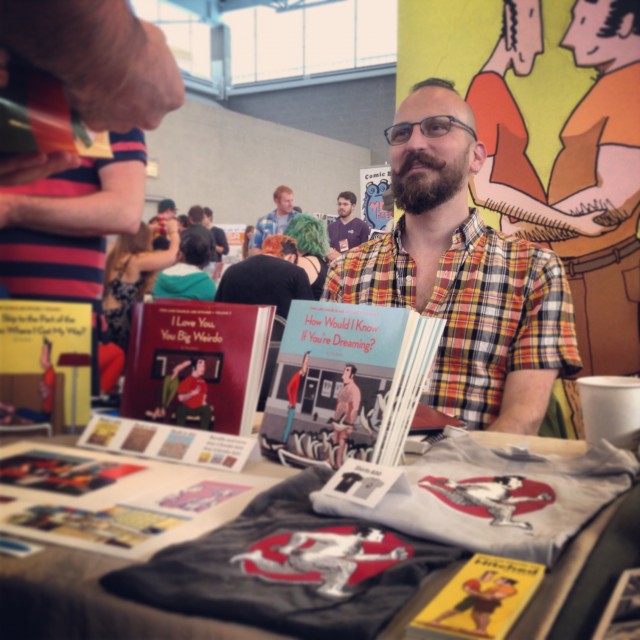
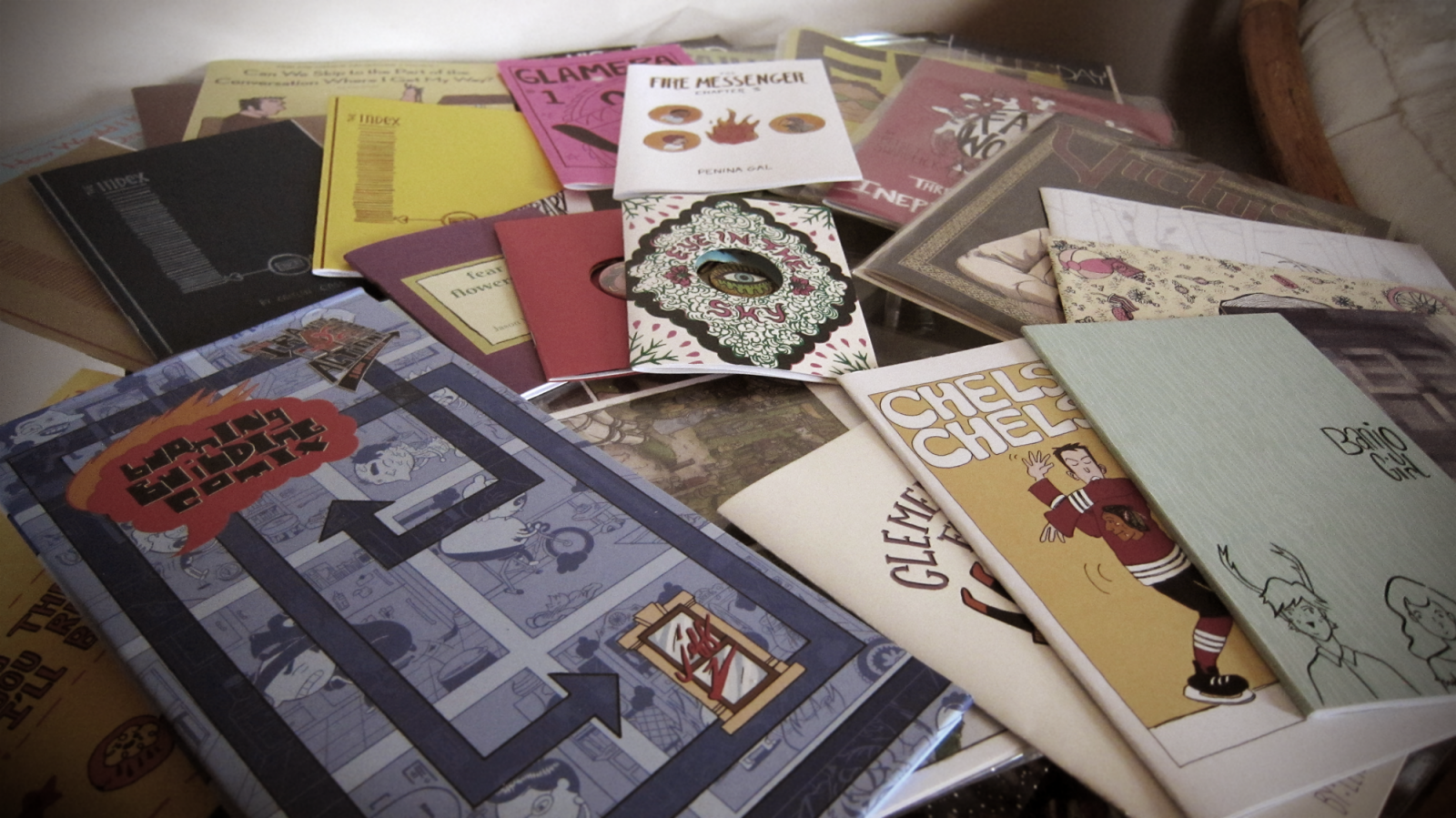
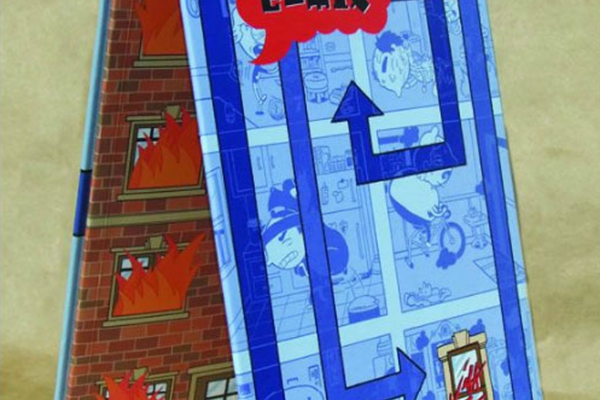
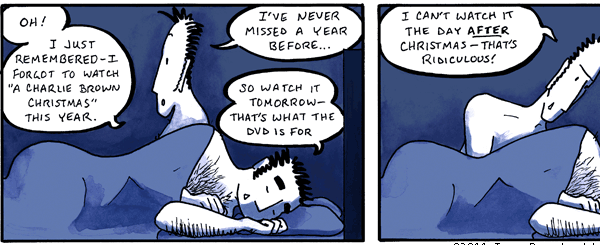
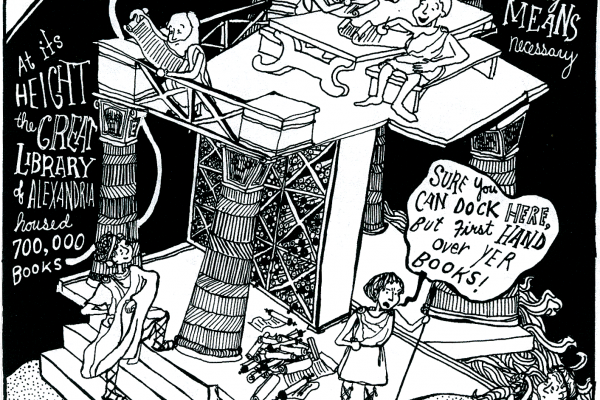
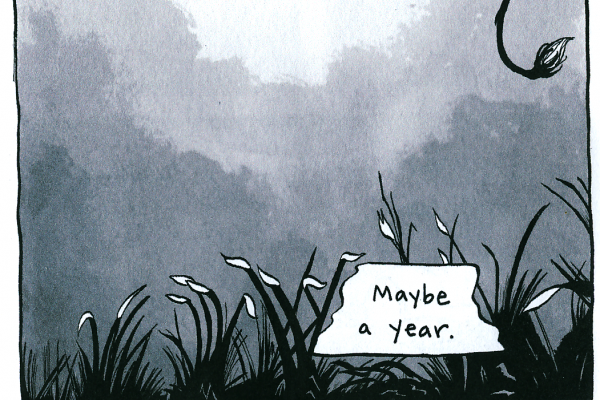
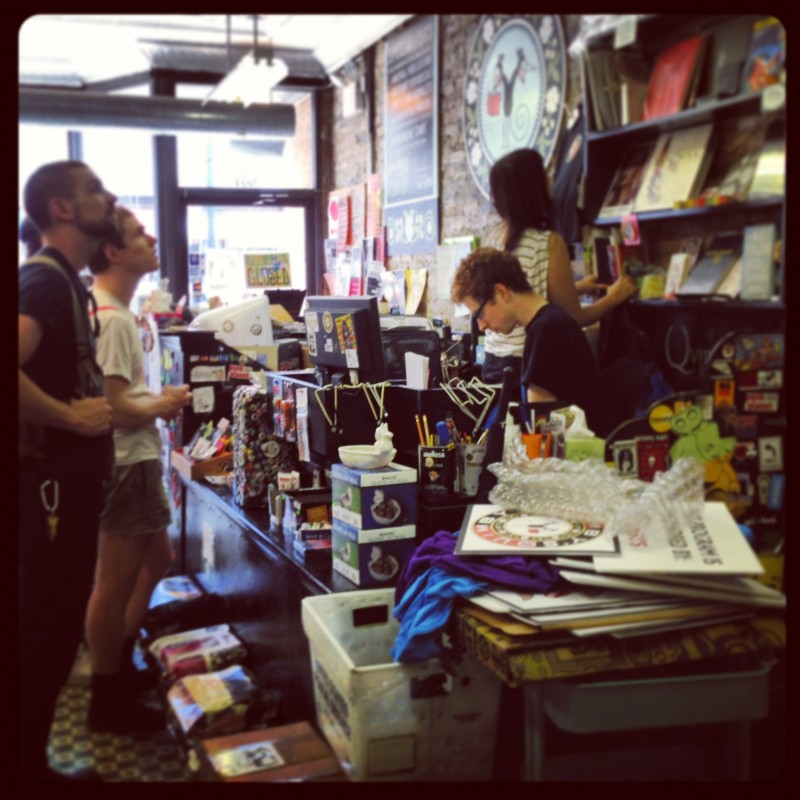
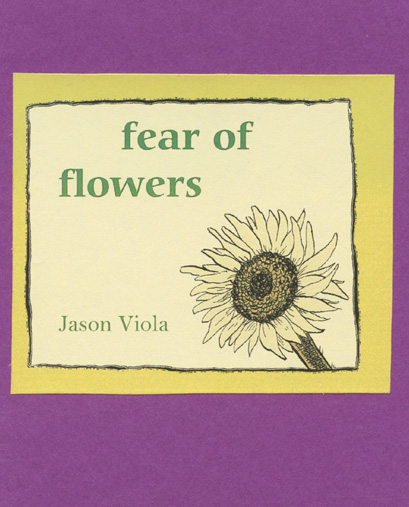


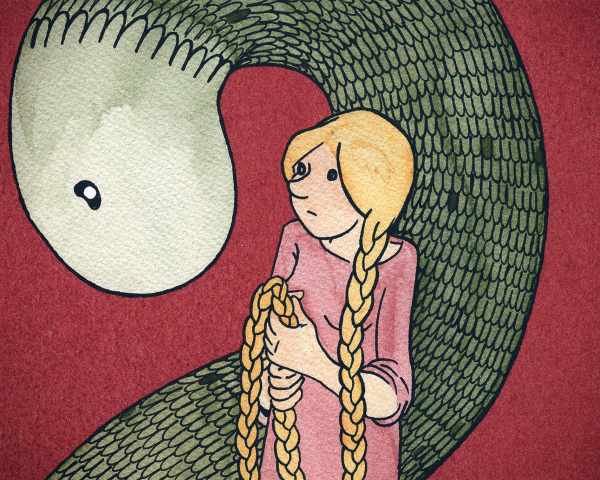
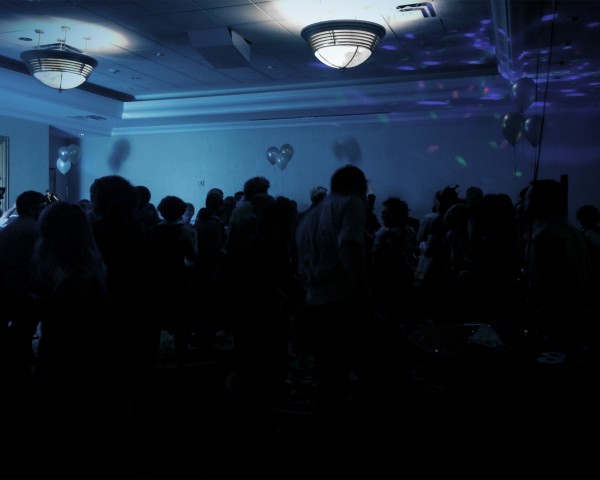

This may be one of the best con reports ever.
Thanks, buddy. I’m honored that a writer of your caliber even bothered to read it.
Fantastic write up. Thanks for talking so openly about sales too. They really sucked for me and most everyone I spoke with. Sorry, you couldn’t find the food room. It was a life saver and probably saved me about 20 dollars in wholefoods lunch runs. As for attendance, while I don’t doubt CAKE organizers promoted well, there was little indication outside of the The Canter on Halstead that there was a massive comics festival going on inside. As far as I could tell there was no signage for the average walker by to casually decide to step into a free show, which is a shame cause it seemed like a neighborhood with a lot of foot-traffic. That was my major concern. But there were so many great people and I was in a fantastic mood all weekend. Thanks again for this, Kenan.
Thanks, Sophia. I figure someone’s gotta electrocute the elephant in the room.
I seem to remember there being a sign outside the Center, although I’m not positive, and I don’t know how effective it was. If any CAKE organizers/volunteers read this, I’d love to have the record clarified.
Thanks for the write up, Kenan, and for the input from both you and Sophia!
There was no sign directly outside of the Center. There was a sign inside the lobby, which is used by all patrons of the Center, and many patrons of the Whole Foods.
Additional signage is definitely something we want to work on for this year. We did do an additional postering run around the neighborhood the week before CAKE, so there’d be posters around, but there’s always room for improvement.
We often talk about how to promote CAKE not only as a cultural event, but also as a marketplace. We really want to make the show as enjoyable and financially successful for all of our exhibitors.
The whole project is a work in progress, and hopefully all aspect will improve each year. And we welcome any recommendations on making it better.
Thanks!
-Neil from CAKE
Thanks, Neil!
(Months later) This is one of the absolute best expo reports I’ve ever read. Bravo, Kenan! You’re a smartie.
Hey, man, takes one to know one.